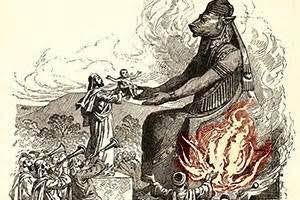As a high school English and History teacher, I have learnt how easy it is to look upon past periods of trauma and upheaval as a detached observer; to placate and assuage any fears that may come to mind about the present with the reflexive ‘isn’t it so great that we’ve outgrown that?’ mindset. Naïve as I was, before October 7th, 2023, I had really started to believe that antisemitism in the West was something people had gradually grown out of, like cassette tapes or jeans with elasticated waistlines. And then, after that harrowing Saturday, footage of unspeakable atrocities came through on Elon Musk’s X platform, followed by several pro-Hamas protests at Ivy League colleges and similar protests at the Opera House steps in Sydney Australia, with zealous and apparently murderous chants uttered repeatedly. So many of us live with the myth of progress undergirding our lives – the sense that as history progresses chronologically, people automatically become more enlightened, more tolerant and more compassionate, as if in lockstep with the calendar. So it can be stultifying and shocking to learn that not everyone shares such a perspective. It may even be arrogant to think that they should.
In his book The Second Mountain, David Brooks writes about a man who bought a property with a bamboo tree near the driveway. The man was happy about the property, but not about the bamboo tree and quickly sought to uproot it. However, the man was also aware of how vigorous and irrepressible bamboo plants are by nature. So:
He took an ax [sic] to its roots and smashed them into little pieces. He dug down and removed as much of the root system as he could and then he poured a plant poison over what remained. He filled the hole with several feet of gravel, and then, taking no chances, paved it over with cement.”[1]
Despite this, two years later he noticed a little green bamboo shoot pushing up through the cement. The plant was apparently indestructible. That bamboo shoot is the best metaphor I know of for the insatiable persistence of antisemitism. If the inception of the United Nations in 1945 followed by the return to Israel of the Jews in 1948 after an almost 2500-year absence appeared to nail the coffin lid on it, it was evident that the bamboo shoot returned with vigour during October 2023.
One of the most ambitious works of historical fiction ever written to address both the persistence of antisemitism and the formidable resilience of the Jewish people in the face of it is James Michener’s The Source. This novel charts the many plights of the Hebrews, from around 10000 BCE to 1964 CE (the time the book was completed). It is set on an archaeological tell in present-day Israel and is comprised of fifteen short stories that span the vast chronological range just alluded to. Every time an artifact is discovered in the present-day, the story uses analepsis (flashback) to determine how the relic came to be there in the first place. Some of the artefacts include coins from different eras, a strigil, an Astarte clay idol from the ancient Canaanites and a glass phial. Arthur Koestler coined the term holon, referring to an entity that is simultaneously a whole object and yet a component of a broader whole. Thus, the novel could be said to have a holarchical structure: the fifteen independent stories (or holons) can be read as stand-alone short stories or as components of the ‘outer’ story of the present-day archaeological tell.
At an estimated 500,000 words and 1032 pages (in my edition), The Source is a demanding read. The emphasis on historical accuracy and verisimilitude is painstaking and I would even say, intimidating. Michener’s writing is heavily expository, descriptive and not particularly dialogue-driven; aspects that will not endear it to the TikTok or Instagram generation. However, few works of fiction manage to so successfully chart the vicissitudes, developments and landmarks in the Judeo-Christian worldview over such a wide-ranging period. This is the novel’s strength: the way that Michener captures momentous paradigm shifts of consciousness amidst the long historical arc drawn. The first story “The Bee Eater” captures tribal people in the pivotal shift from the hunter-gatherer mentality to the development of agrarian living through the sudden epiphany of a female character: “she saw [the hunters] outlined for a moment against the ripened wheat and realized for the first time that in the future, men like Ur [her husband] would not go venturing into the swamp like excited boys but would stay closer to home…”[2] Whether or not such momentous shifts are historically accurate is an educated guess. What does seem to be indisputable is that for Michener then and us now, inspiration is the engine behind genuine progress.
One of the best and most memorable of the fifteen stories is “Of Death and Life”. Set in 2200 BCE it depicts a Canaanite culture enthralled to the ritual of child sacrifice to the god Melak (presumably based on Molech in the Hebrew scriptures) in order to ensure a favourable harvest of crops for these agrarian people. The protagonist is a hard-working farmer named Urbaal. Urbaal is not painted by Michener as a villain; he is simply an industrious and pro-active farmer who is profoundly misguided. Urbaal is married to Timna; a dedicated and virtuous wife who is heavily pregnant at the beginning of the story. She is also beset with grief and horror at the realisation that she will have to offer up her first child once born in order to fulfil her societal and familial obligation. Timna stands out as the lone voice of reason – the only one in the culture to see the ritual for the abomination it undoubtedly is: “‘What folly! The fertility is in the soil. It is in me.’ And while others celebrated she walked slowly homeward, seeing life in a new and painful clarity: with different gods her husband Urbaal would have been a different man….”[3] And so, well before the author of Psalm 115 wrote – about idols of stone and wood – “Those who make them become like them” (v.8), Michener visualises the connection between perception, veneration, manifestation and declining civilization in a convincing and powerful way.
Another excellent story in The Source is “In the Gymnasium”, set in 167 BCE, just prior to the Maccabean revolt that would be later inaugurated in the annual festival of Hanukkah – still celebrated today. The story charts a series of changes to Jewish laws within the Seleucid empire as the sinister Antiochus IV instigates legislative reforms designed to uproot the distinctive religious precepts of Judaism. It begins with the Jews being forced by law to “acknowledge that the god Zeus has come to earth in the person of our divine emperor, Antiochus Epiphanes.”[4] The Jews grudgingly acquiesce to this request. Shortly afterwards, a new law is announced, “requiring all citizens to present themselves four times a year to pay formal homage to Antiochus Epiphanes as the senior god of the Seleucids”.[5] The Jews are even less sanguine about fulfilling this decree but continue to do so: “the Jews marched each quarter to the temple to pay proper homage to Antiochus the emperor; but in their hearts they ignored Epiphanes the presumptuous god.”[6] It becomes apparent to these descendants of Hebrews that Antiochus is adopting a ‘death by a thousand cuts’ approach: slowly but surely attempting to destroy the influence of the Torah on these people one slice at a time. So when Antiochus Epiphanes decrees that the Jewish people must no longer circumcise their male children, the civil disobedience among the dogmatic Jews begins. Childbirths start to occur in secret and an elaborate game of concealing newborns from the government officials starts.
Another subplot of “In the Gymnasium” concerns a Jewish youth named Menelaus (his birth name is Benjamin but he scornfully rejects it in favour of a more Hellenised option) and Jehubabel his father, the leader of the Jewish community. Menelaus is a promising young wrestler with vast athletic potential who has contempt for his Jewish roots and thoroughly assimilates himself into the Greco-Roman culture he is immersed in. When the increasingly bullish Antiochus decrees that no participant in the upcoming Olympic games may be circumcised (athletes fought in the nude in this era), as this would be an offense to “the spirit of the games”[7], Menelaus is left in a quandary. He resolves this by choosing to undergo a painful and irrevocable reversal of his circumcision in preparation for his fight. His choice to do this becomes such an outrageous affront to Jehubabel and the other Jews that a major uprising is sparked. After being goaded repeatedly, this is the final insult and Jehubabel and the others effectively ask, why on earth are we putting up with this?
Perhaps because we currently find ourselves in an Olympic season, “In the Gymnasium” has raised a pertinent issue: at what point does civil disobedience become the appropriate response to tyranny? Ironically, nudity in the Olympics has become topical in 2024, but for markedly different reasons. This time, it did not concern any athletes participating, but concerned decisions made by the choreographer Thomas Jolly and his participants in the opening ceremony. Viewers of the ceremony like myself were left wondering if it was absolutely necessary for one of the male participants to stand within the bacchanalian tableau of Da Vinci’s The Last Supper with a testicle protruding out of tight shorts, whilst a young child performer was in tow? And while this has not yet sparked a Maccabean-style revolt, it has made me ask, why on earth are we putting up with this? How much does one tolerate in a liberal society before saying enough is enough?
And yet, mere moral outrage is never virtuous in and of itself. Marshall McLuhan once said: “Moral indignation is a technique used to endow the idiot with dignity.[8]” It is simply not compelling to be defined by what you are against. And perhaps this – after all – is why the Jews have such endurance and resilience after 5000+ years. They are defined by what they are for. They live by a more compelling story than most of us in the West. The belief that they are the custodians of God’s ancient covenant with Abraham, the belief that they are like a beacon on a hillside to demonstrate a better way for humans to flourish, the belief (and reality) that the extermination of around six million of their kin during World War II has not been enough to destroy their spirit or their purpose. Perhaps this is why Israel has bucked the trend of all the western democratic countries in recent years. Ross Douthat puts it this way:
If you go through every wealthy country in the world and look at their birth rates, they’re all below replacement [levels]… South Korea has a birth rate of one. Which means every two people are being replaced by one young South Korean….[This speaks to] a lack of confidence and optimism in the future. The exception is Israel. Israel has a birth rate over three…… There is this sort of sense of mission and purpose, that we are the Jewish state…we are embattled and surrounded by enemies and therefore we know who we are and what we’re doing and what we’re going to fight for.[9]
Sadly, antisemitism appears to be something that cannot be outgrown, so if the rest of us learn nothing else from the Jews, what we could learn is how to live with a more galvanising story. In the last ten or so years, there has been a popular tendency articulated by a few, but held by many, such as gay activist Dan Savage, who says “there’s too many goddamn people on the planet[10]”– a sentiment that seems self-effacing yet disturbingly genocidal in its implications. The mentality of Malthusian scarcity uttered by such people does not offer much in the way of hope or inspiration.
[1] David Brooks, “Heart and Soul”, in The Second Mountain (2019), Penguin, Random House: UK. p.44.
[2] James Michener, The Source (1965), Secker & Warburg Ltd., Great Britain. p.95.
[3] Ibid. p.142.
[4] Michener, p.360.
[5] Ibid., p.361.
[6] Ibid.
[7] Ibid., p.384.
[8] Tom Wolfe, “In the Land of the Rococo Marxists”, in Hooking Up (2000), Picador: New York. p.117.
[9] https://www.oneplace.com/ministries/-the-christian-outlook/player/the-decadent-society-how-we-became-victims-of-our-own-success-eric-metaxas-with-ross-douthat-808312.html#now-playing






